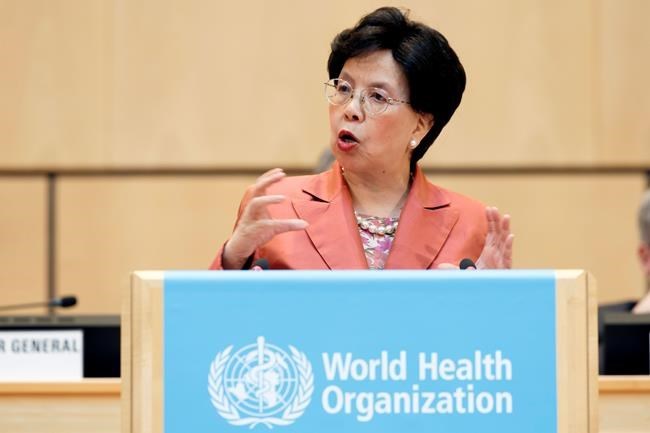
China's Margaret Chan, Director General of the World Health Organization, WHO, addresses her statement, during the 69th World Health Assembly at the European headquarters of the United Nations in Geneva, Switzerland, Monday, May 23, 2016. (Salvatore Di Nolfi/Keystone via AP)
May 25, 2016 - 3:59 PM
GENEVA - Stung by failures in its response to Ebola, the World Health Organization is revamping how it responds to emergencies to become nimbler, more reactive and more operational in "one of the most profound transformations" ever at the U.N. health agency.
Member states agreed to the changes Wednesday at the World Health Assembly in Geneva, aiming to streamline decision-making and put logistical and medical teams on the ground faster amid wars, natural disasters and outbreaks of viruses like Ebola, Zika or yellow fever, officials said.
A WHO statement said the creation of the new Health Emergencies Program was "one of the most profound transformations in the organization's history."
Emergency response chief Dr. Bruce Aylward says the changes aim to move WHO away from being a technical and "risk-averse" agency toward one with a "no-regrets approach" that would favour possibly over-deploying in emergencies and then "peel back as necessary," over not doing enough.
Aylward said "forward-deployed" teams would monitor the vulnerability of areas to big health risks, and WHO would seek to avoid instances where "seniority gets in the way of the best technical advice" by assigning incident managers to oversee response.
He acknowledged the changes would require a "cultural adjustment" at WHO, and said some aspects were already being tried out in the Zika response today in Latin America.
The agency has often been too slow in responding to health crises, and "Ebola really brought it to a head," Aylward said by phone.
WHO was faulted for broad mismanagement that hamstrung the world's response to Ebola, which has killed more than 11,300 people, mostly in West Africa. It resisted sounding the alarm on the outbreak for two months on political, religious and economic grounds and failed to put together a decisive response even after the alert was issued.
"You had great technical people on the ground" in the Ebola response, Aylward said. "But the reality is that they spent lot of time finding accommodation or finding gas — not finding virus ... We couldn't scale to the magnitude of the problem."
Assembly delegates agreed to put $494 million in the program for 2016-2017, an increase of nearly 50 per cent from prior emergency funding levels. Aylward expressed hopes to double WHO's emergency response capacity from about 500 people today over the next 18 months.
News from © The Associated Press, 2016